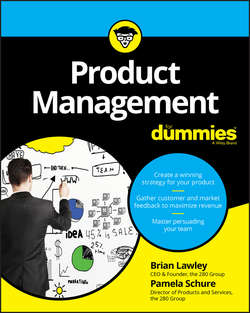Читать книгу Product Management For Dummies - Brian Lawley - Страница 8
На сайте Литреса книга снята с продажи.
Part 1
Getting Started with Product Management
Chapter 2
Getting in Character: Discovering Your Role as a Product Manager
Conducting a Self-Assessment: Traits of a Great Product Manager
ОглавлениеBecoming a great product manager is the work of a lifetime. The work is complicated. The skills and talents that you have to bring to the role are many. And just when you think you’ve mastered them all, you realize you haven’t used one in a while and need more practice. Having the characteristics and skills of an amazing product manager make the job a great one if you like variety and challenges. The following sections detail the eight most important traits of great product managers. You can use Table 2-1 in the section “Scoring your product manager traits” later in this chapter to rank yourself.
TABLE 2-1 Ranking Your Product Manager Traits
Business acumen
You know that product managers need to focus on getting the product right and listening to customers. However, your company needs to make money to survive. This hard-core business acumen is what it takes to make profitable products. Business acumen includes careful consideration of the following topics:
❯❯ Pricing a product at the level that leads to a safe profit margin. You need to know the complete cost structure of your product and offering, including corporate overhead.
❯❯ Double-checking all contractual business terms to make sure you haven’t given too much away to your channel, your partners, or your customers.
❯❯ Being aware when a business negotiation with an internal and, especially external person or organization isn’t proceeding with your interests in mind. You need to balance both sets of needs.
You don’t pick up business skills in a vacuum. You get them from more experienced people in your company. Luckily, most of your negotiations focus on internal exchange of resources like people and money. Prior to any serious negotiation, get as complete a list as possible from your manager as to what is allowed to be part of the discussion and what is outside of the discussion. Then walk in with a list of the boundaries that you can operate in. Don’t lead with those boundaries. If you’re uncertain, stop and double-check to make sure that you haven’t given up something that your department shouldn’t commit to. Safe is better than sorry.
Industry knowledge and expertise
Many product managers come from the industry that they serve. They’re industry specialists first and product managers second. In general, this attribute is great because you’re already familiar with your industry and the key business drivers.
What happens when an industry is in transition? As you use your industry knowledge and expertise in a product management role, keep an eye over your shoulder for industry disruptors. Imagine you were a product manager for the taxicab industry. Would you predict that a service like Uber would transform the taxi industry? You then need to shift your energy to convincing your company that it’s time to move – or possibly watch your company die.
Technical knowledge
One of the fun parts of the product manager role is having a technical conversation with someone even more technical than you are. Yes, you need to know the core technology that supports your product. So ask a technical person to give you an in-depth briefing on all the ins and outs of your product. As the briefing continues, add your own notes as to the difference this information makes to the customer. Your goal is to know the technical terms and translate that into the value that the technology delivers to your customer.
Конец ознакомительного фрагмента. Купить книгу
